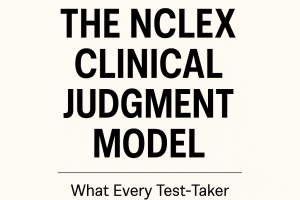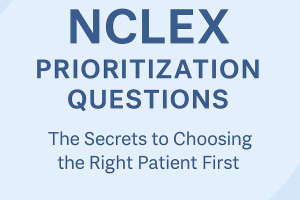Prenatal Care and Complications of Pregnancy: Essential Knowledge for NCLEX Preparation

Prenatal care is a vital aspect of maternal and fetal health, ensuring the well-being of both the mother and baby throughout pregnancy. Early and consistent prenatal care helps prevent complications and promotes healthy development. As a nurse, understanding prenatal care and being able to recognize the complications of pregnancy are critical to providing the best possible care and passing the NCLEX exam. This blog post will explore the essentials of prenatal care, common pregnancy complications, and tips for NCLEX preparation.
Importance of Prenatal Care
Prenatal care includes regular medical check-ups and tests to monitor the health of the mother and developing fetus. Proper prenatal care helps to:
- Identify and manage preexisting conditions
- Detect and address potential pregnancy-related complications
- Provide nutritional guidance
- Educate about labor, delivery, and infant care
Stages of Prenatal Care
First Trimester (Weeks 1–12)
- Initial Visit: Comprehensive history taking, including medical, surgical, and obstetric history. Physical exams, weight, blood pressure, and routine lab tests (blood type, Rh factor, hemoglobin, HIV, hepatitis B, rubella titer) are performed.
- Ultrasound: Typically done between 8–12 weeks to confirm the pregnancy and estimate gestational age.
- Patient Education: Advise on prenatal vitamins (especially folic acid), lifestyle modifications (avoiding alcohol, tobacco, and drugs), and expected changes in pregnancy.
Second Trimester (Weeks 13–26)
- Routine Visits: Every four weeks. Check maternal weight, fundal height, fetal heart rate, and blood pressure.
- Ultrasound: An anatomy scan is often performed around 18–20 weeks to assess fetal development and detect any anomalies.
- Screening Tests: Glucose tolerance test for gestational diabetes is conducted around 24–28 weeks. Rho(D) immune globulin (RhoGAM) is administered to Rh-negative mothers at 28 weeks.
Third Trimester (Weeks 27–40)
- Routine Visits: Every two weeks from 28–36 weeks, and weekly thereafter. Continue to monitor fetal growth, position, and well-being.
- Group B Strep Test: Done between 35–37 weeks to check for Group B streptococcus infection, which could be harmful to the baby during delivery.
- Patient Education: Discuss labor signs, birth plan, and breastfeeding.
Complications of Pregnancy
1. Gestational Diabetes
- Pathophysiology: Develops when the body cannot produce enough insulin to meet the increased demands during pregnancy.
- Risk Factors: Obesity, advanced maternal age, family history of diabetes.
- Nursing Care: Monitor blood glucose levels, provide dietary counseling, and educate about the importance of regular exercise. Insulin therapy may be needed in some cases.
- Complications: Can lead to macrosomia (large baby), preeclampsia, or increased risk of developing type 2 diabetes postpartum.
2. Preeclampsia
- Pathophysiology: A condition characterized by high blood pressure, proteinuria, and organ dysfunction, usually developing after 20 weeks of pregnancy.
- Symptoms: Hypertension, severe headaches, visual disturbances, and swelling (especially in the face and hands).
- Nursing Care: Regularly monitor blood pressure, educate on warning signs, and perform fetal assessments. Magnesium sulfate may be administered to prevent seizures (eclampsia).
- Complications: Can lead to placental abruption, preterm birth, and maternal organ damage.
3. Placenta Previa
- Pathophysiology: Occurs when the placenta covers the cervical opening, potentially causing severe bleeding during pregnancy or delivery.
- Symptoms: Painless, bright red vaginal bleeding in the second or third trimester.
- Nursing Care: Monitor maternal and fetal well-being, advise rest, and avoid vaginal exams to prevent triggering hemorrhage. Cesarean delivery is often required.
- Complications: Hemorrhage, preterm birth, or growth restrictions for the fetus.
4. Placental Abruption
- Pathophysiology: The placenta prematurely detaches from the uterine wall, leading to bleeding and compromised oxygen supply to the fetus.
- Symptoms: Sudden, painful vaginal bleeding, abdominal pain, and uterine tenderness.
- Nursing Care: Emergency care is required. Monitor vital signs, fetal heart rate, and prepare for an emergency delivery if necessary.
- Complications: Fetal distress, preterm birth, or maternal hemorrhage.
5. Preterm Labor
- Pathophysiology: Labor that begins before 37 weeks of gestation.
- Risk Factors: Infections, multiple pregnancies, or a history of preterm birth.
- Nursing Care: Administer tocolytics (medications to stop labor) if appropriate, corticosteroids to promote fetal lung development, and monitor for signs of labor.
- Complications: Increased risk of neonatal respiratory distress syndrome, feeding difficulties, or long-term developmental issues.
6. Ectopic Pregnancy
- Pathophysiology: Occurs when a fertilized egg implants outside the uterus, most commonly in the fallopian tubes.
- Symptoms: Sharp pelvic pain, vaginal bleeding, and signs of shock if the tube ruptures.
- Nursing Care: Immediate medical intervention is required. Methotrexate can be used to dissolve the pregnancy if caught early, or surgery may be necessary to remove the ectopic pregnancy.
- Complications: Rupture of the fallopian tube, hemorrhage, or infertility.
Nursing Care for Pregnancy Complications
- Monitoring: Keep a close eye on vital signs, especially blood pressure, and monitor for any signs of fetal distress or maternal complications.
- Patient Education: Inform pregnant women about potential complications, signs to watch for (e.g., severe headaches, blurred vision, bleeding), and when to seek medical care.
- Nutritional Guidance: Provide recommendations for a balanced diet, especially in conditions like gestational diabetes or preeclampsia, where specific dietary adjustments are crucial.
- Emotional Support: Complications during pregnancy can be stressful and emotionally taxing. Provide support and resources for mental health and stress management.
Sample NCLEX Questions
Question 1
A pregnant woman at 32 weeks gestation presents with a sudden onset of painless vaginal bleeding. What complication should the nurse suspect?
A. Placental abruption
B. Placenta previa
C. Ectopic pregnancy
D. Preterm labor
Answer: B. Placenta previa. Painless vaginal bleeding in the third trimester is a hallmark sign of placenta previa.
Question 2
A nurse is educating a patient with gestational diabetes. Which statement indicates the need for further teaching?
A. “I should check my blood sugar regularly.”
B. “I can eat whatever I want as long as I take my insulin.”
C. “I should exercise regularly to control my blood sugar.”
D. “I need to monitor my baby’s movements.”
Answer: B. “I can eat whatever I want as long as I take my insulin.” Dietary management is a key part of controlling gestational diabetes, and insulin does not replace the need for proper nutrition.
Question 3
A nurse is caring for a patient with severe preeclampsia. Which of the following is the priority nursing intervention?
A. Administer oxygen via nasal cannula
B. Prepare the patient for a cesarean delivery
C. Administer magnesium sulfate
D. Obtain a prescription for antihypertensives
Answer: C. Administer magnesium sulfate. Magnesium sulfate is used to prevent seizures (eclampsia) in patients with severe preeclampsia.
NCLEX Tips for Prenatal Care and Pregnancy Complications
- Understand the stages of prenatal care: Be familiar with the timing of routine visits, tests, and key milestones in each trimester.
- Recognize the signs of pregnancy complications: Know the symptoms of conditions like preeclampsia, placental abruption, and preterm labor.
- Know the nursing interventions: For each complication, understand what actions are needed to manage the patient and prevent worsening of the condition.
- Prioritize patient safety: Questions related to pregnancy complications often focus on prioritizing care, such as what action to take first when a patient presents with a certain symptom.
Conclusion
Understanding prenatal care and pregnancy complications is essential for providing safe, effective nursing care and preparing for the NCLEX. By familiarizing yourself with the common complications of pregnancy and knowing how to manage them, you’ll be better prepared to handle questions on this topic in the NCLEX and provide quality care to pregnant patients in your clinical practice.






